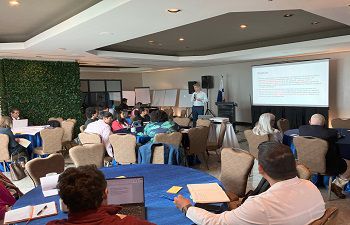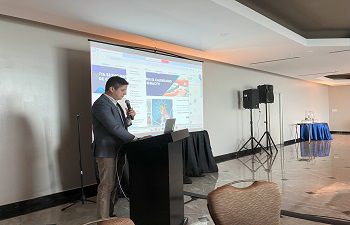SPRU researchers co-develop funding call to address complex development challenges in Panama
Posted on behalf of: Transformative Innovation Policy Consortium
Last updated: Wednesday, 14 May 2025


Researchers from the Business School’s Transformative Innovation Policy Consortium (TIPC), working alongside the National Secretariat of Science and Technology of Panama (SENACYT) and the Inter-American Development Bank (IDB), have recently co-designed a major public funding call to drive forward Transformative Innovation.
This call seeks to tackle critical sustainability challenges in Panama, focusing on four main areas: agriculture, health, climate change and logistics. SENACYT and the IDB are committing USD 300,000 to fund up to six innovative, one-year projects, with individual grants of USD 50,000.
The call invites researchers, NGOs, policymakers and civil society organisations to submit proposals that experiment with innovative forms of governance, practices and narratives to accelerate sustainability transitions in the four areas prioritised.
The funding call was officially launched by SENACYT on 23rd April. The subsequent lunch event, held on 30th April in Panama City, included a Q&A session with approximately 120 researchers joining in-person and online, with TIPC researchers on hand to answer questions.
Developing impactful partnerships for progressive and sustainable futures
SENACYT’s support for a transformative innovation strategy reflects a desire for STI policy to embrace more clearly the Sustainable Development Goals (SDGs) as well as to adopt a more systemic approach to policy.
In his opening remarks at the launch event, Gilberto Gómez, leader of the recently created Policy Unit at SENACYT, highlighted the crucial nature of this initiative when he said, 'SENACYT is exploring new ways to address sustainable development and this funding call is an important step forward in that direction.'
This determination to collaborate on innovative projects aimed at meeting the SDGs, especially when these address the concepts of a Just Transition, align well with TIPC’s core values.
Harnessing research for transformative change
In order to develop the funding call, TIPC researchers, Dr Claudia Obando, and Dr Matias Ramirez, the project’s Principal Investigator, worked at the policy level alongside colleagues from SENACYT’s Policy Unit, providing training for potential applicants using Transformative Innovation Policy (TIP) tools developed from TIPC’s cutting-edge innovation and transitions research.
This initiative demonstrates real impact from the collaboration agreement established in 2024 between SENACYT and SPRU. Key to the collaboration is that the impact will not only be felt by researchers and policymakers, but, crucially, by ordinary Panamanians reaping the benefits as these projects are rolled out.
As Dr Obando notes, 'We will continue to support the selected projects through formative evaluation, using theories of change and facilitating collaborative learning and experimentation among communities, researchers and policymakers at both local and regional levels. These initial projects will, in turn, pave the way for continued work on Transformative Innovation Policy. The funded projects themselves also have the potential to make a positive and lasting difference to the lives of ordinary people in Panama.’
Enabling and embedding learning across borders
In addition to the Consortium’s Latin American and Caribbean hub which has led this work, the TIPC team at SPRU also coordinates policy experiments and capacity building work via an extensive network of members and partners in its European and African hubs.
New TIP tools are regularly developed and made available via the open-access TIP Resource Lab. Additionally via our Open Learning Series events, researchers, policymakers and representatives from intergovernmental agencies and NGOs regularly share insights with the wider TIP Community of Practice on how they are applying TIPC’s research and tools across different systems in transition, such as energy, health and transport, to enact transformative change in different regions of the world. By leveraging collaborations and partnerships such as this one with SENACYT, TIPC is working to maximise the impact and reach of its work.
